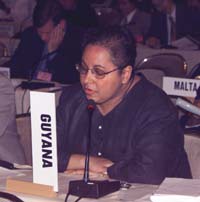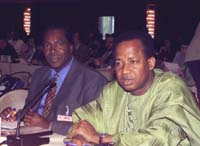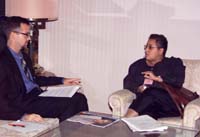|
UNFCCC
Subsidiary Bodies SBI-10 and SBSTA-10 |
||
|
|
|
|
The
European Union and partners accused of "double standards"
over proposal for a quantified cap on the use of Kyoto Mechanisms The United States representative said his country recognised the need for domestic action against climate change and the strength of feeling many Parties hold in this regard. He outlined existing domestic programs in the US and defended the 'ambitiousness' of his country's Kyoto commitments. He added: "In Kyoto, there was a recognition that the targets agreed to in Annex B would require the full and timely availability of all the Kyoto mechanisms. This is as true today as it was in Kyoto. In this regard the U.S. regrets the proposal of the EU to place a quantitative and qualitative cap on those mechanisms In our view, the EU proposal would reopen and unbalance the package of ambitious commitments and flexible implementation that we all agreed to in Kyoto: 1.
By placing artificial ceilings on how much "assigned amount"
Parties may acquire through the mechanisms, and The U.S. went on to suggest that the EU proposal reflects a "clear double standard" in how it applies to the EU and others. If the cap proposals were to go forward, they would hurt all Parties and they would hurt the environment. Developing countries would be particular losers due to restrictions placed on new private sector resources for investments through the CDM. The EU position was also challenged by New Zealand, Australia, Japan, Canada, the Russian Federation and Norway. New Zealand "squarely rejected" the proposition. Australia repeated the view that a ceiling on the use of the Kyoto Mechanisms could stifle CDM investment. The Russian Federation described the EU proposal as a "bad gift" for COP-5. Uganda, for the African group, and India, for the G-77/China, supported the EU. No
comfort from the NGOs Core
issues emerging at the subsidiary bodies
Alliance of Small Island States calls for formal response to Annex
I Parties' failure to honor Convention commitments |











